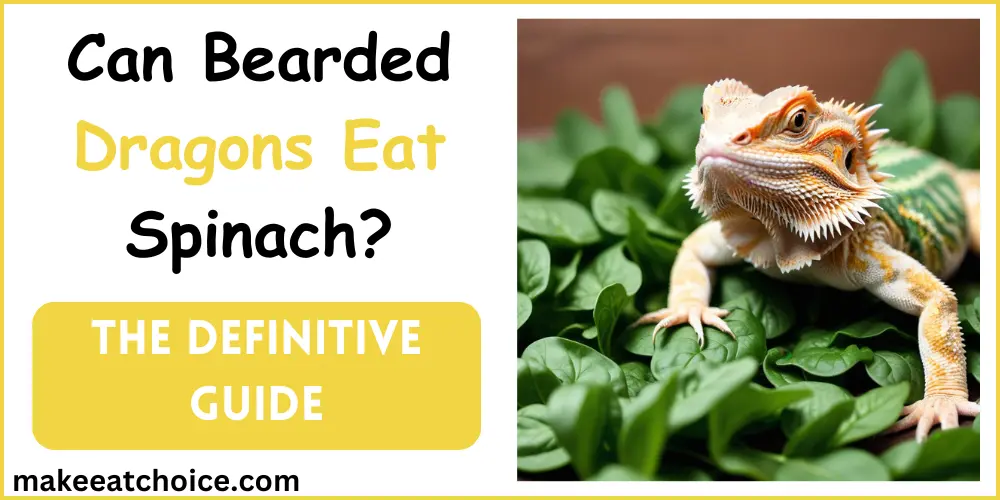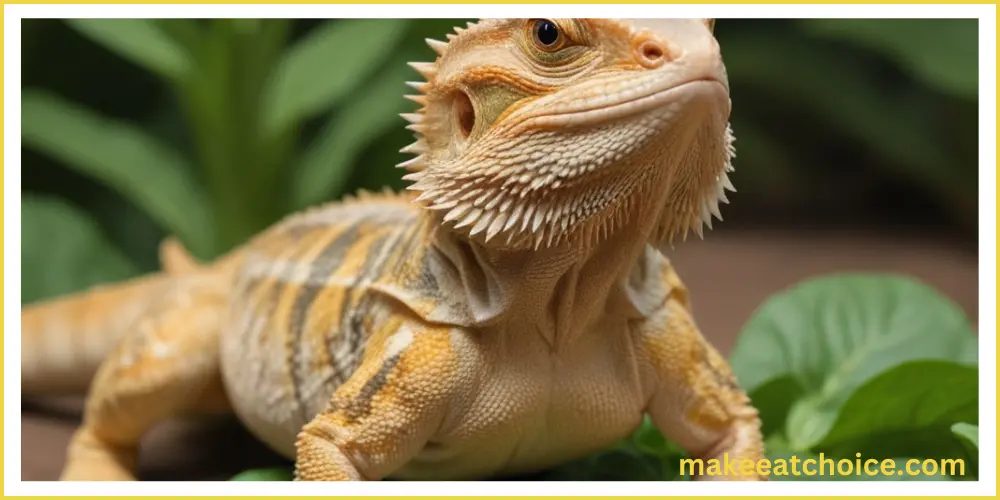
With their inquiring gaze and unusual appearance, bearded dragons have become a popular choice among reptile enthusiasts. Like any other pet, these critters rely on their owners to provide a well-balanced diet for survival. One common question is whether can bearded dragons eat spinach. This comprehensive tutorial delves into the spinach controversy, determining what’s best for your bearded dragon and how to guarantee they get the proper nourishment.
Can Bearded Dragons Eat Spinach?
Bearded dragons are intriguing reptiles known for their varied diet, but exercise caution when it comes to spinach. While spinach is not poisonous to bearded dragons, it should be fed sparingly and in moderation due to its high oxalic acid concentration. Oxalic acid can bind to calcium, perhaps leading to a calcium shortage in these reptiles.
When providing spinach to your bearded dragon, ensure it has been carefully cleaned to remove any pesticides or dangerous chemicals. To avoid choking concerns, slice it into small, manageable pieces. Incorporating a variety of leafy greens into the bearded dragon’s diet, such as collard greens, mustard greens, and dandelion greens, can provide a balanced nutritional profile without the hazards of overfeeding spinach.
Bearded dragons can eat spinach but must do it rarely and in combination with other acceptable leafy greens to maintain their health and well-being. Always see a reptile veterinarian or expert for tailored food advice for your specific pet.
Delving Into the Spinach Lifestyle of Bearded Dragons
What’s In Spinach?
Spinach, noted for its beautiful green color and use in salads, contains various nutrients necessary for all living things. It contains high levels of vitamins A, C, K, folic acid, calcium, iron, and fiber. These ingredients may appear ideal additions to a bearded dragon’s diet, but the benefits and risks must be carefully weighed.
How Often Can Bearded Dragons Eat Spinach?
Feeding frequently is essential for your bearded dragon’s health. Spinach is beneficial in moderation but should not be a staple in their diet. A bearded dragon’s diet should consist primarily of insects and leafy greens, with spinach being one of several alternatives. It is advisable to serve spinach once or twice a week at most.
How to Feed Spinach to Bearded Dragons
When preparing spinach for your bearded dragon, carefully clean it to remove any pesticides or debris. Cut the spinach into manageable bits because your pet may struggle to eat huge leaves. Juvenile bearded dragons should be fed finely chopped spinach to reduce choking concerns.
Can Bearded Dragons Eat Baby Spinach?
While baby spinach is praised for its softness, it remains a contentious ingredient in a bearded dragon’s diet. Baby spinach and ordinary spinach have similar nutritional profiles, but because baby spinach is less robust, it may be slightly easier for bearded dragons to ingest and digest.
How Can Bearded Dragons Eat Spinach?
How you serve spinach is almost as important as whether you offer it. Bearded dragons’ teeth are tiny and used primarily for grasping and crushing food rather than eating. Cut the spinach into little pieces to fit their eating habits.
Nutritional Composition of Spinach for Bearded Dragons

Balanced Meal or Nutritional Nightmare?
Spinach has a great nutritional profile but also contains a high concentration of oxalates. Oxalates can bind to calcium and inhibit its absorption by the lizard’s body, potentially causing shortages. Too many oxalates can cause Metabolic Bone Disease, a dangerous illness that affects reptiles.
The Benefits of Balancing Greens in a Beardie’s Diet
In moderation, spinach can provide a welcome dose of vitamins and minerals essential for a bearded dragon’s growth, development, and immune system maintenance. The key is a variety set against a backdrop of moderation. By combining spinach with other leafy greens, you are offering a more diverse nutritional profile.
The Importance of Calcium
Like all reptiles, bearded dragons require enough calcium to maintain bone health and prevent disorders like MBD. Because spinach contains oxalates, which bind calcium, sprinkling it with calcium powder is critical to correct any potential imbalance.
Potential Benefits of Spinach for Bearded Dragons
Bearded dragons, which inhabit arid, semi-desert environments, are not known to be picky eaters. They make the best use of available nutrients when fed a varied diet. Spinach provides Vitamin A, essential for the beardie’s vision, skin health, and immunological function.
Potential Risks of Feeding Spinach to Bearded Dragons
The Calcium Conundrum
High oxalate levels can interact with calcium in the diet, limiting the availability of this essential mineral. This could lead to serious health problems in the long run; therefore, eating spinach in moderation is crucial.
Oxalates – When Too Much of a Good Thing Isn’t Good
Spinach contains moderate to high amounts of oxalates. These substances interact with minerals in the lizard’s intestines, potentially causing kidney stones, physiological abnormalities, and other major health problems. Bearded dragons should not be fed too much spinach.
The Quintessential Hydration Question
Spinach contains little water; therefore, increasing the amount of spinach in your bearded dragon’s food may inadvertently reduce their overall water consumption. This could lead to dehydration, which has its own set of health risks.
Moderation and Balance in a Bearded Dragon’s Diet
The Balanced Beardie
Bearded dragons should eat mostly live insects, leafy greens, and small fruit. Incorporate spinach into your green rotation, but keep it from overwhelming other greens like collard, mustard, or turnip, which can provide equal benefits without the oxalate load.
The 80/20 Principle
A well-balanced beardie diet should consist of 80% non-starchy vegetables, 20% protein (insects), and occasional fruits. However, it is critical to research each item to discover its role in the larger nutritional picture.
Observing and Responding to Bearded Dragon Health
Signs of a Healthy Bearded Dragon
An energetic, alert, and responsive lizard is often in good health. A bearded dragon with a nutritious diet will have vivid colors, clear eyes, and skin.
When to See a Vet
If you find your bearded dragon is lethargic, refusing to eat, having tremors, or exhibiting signs of metabolic bone disease, contact a reptile veterinarian immediately. Prevention is vital, so make sure your lizard’s diet is well-supplemented and balanced from the start.
Related:
FAQs
Can Bearded Dragons Eat Raw Spinach?
Bearded dragons can eat raw spinach, but it must be properly prepared and served in carefully managed quantities.
What Veg Can Bearded Dragons Eat?
Bearded dragons eat a broad variety of veggies and fruits. Kale, collard greens, mustard greens, and squash are all suitable veggies. Safe fruits include blueberries, raspberries, and bananas, but only in moderation.
What Leafy Greens Can Bearded Dragons Not Eat?
Plants from the nightshade family, such as raw parsnips, should not be fed to bearded dragons since they may be harmful. Limit high-oxalate plants such as spinach, chard, and beet greens to maintain a well-balanced diet.
What Can Not Bearded Dragons Eat?
Avocados, rhubarb, and fireflies are harmful to bearded dragons.
What Is Toxic to Bearded Dragons?
Certain foods, plants, and insects are harmful to bearded dragons. It is critical to investigate and offer only safe solutions for your pet.
What Is a Bearded Dragon’s Favorite Food?
Crickets, worms, and certain leafy greens, such as collard and mustard, are popular among bearded dragons.
Conclusion:
In the end, the debate over spinach comes down to one key factor: balance. Spinach contains nutrients that your bearded dragon can benefit from, but only if consumed carefully and in moderation. Understanding the potential hazards and how to incorporate greens into their diet assures these beautiful creatures’ vibrant and healthy existence. By remaining aware and mindful of their nutritional requirements, you can transform this leafy debate into a healthy chapter in your bearded dragon’s life.
References:
- By NomadicMover, There seems to be conflicting thoughts on feeding spinach. This is what I could find on reptifiles which is often my go-to. Thoughts? Posted 1 Year Ago.



